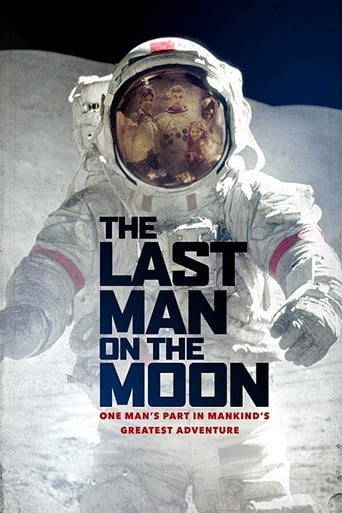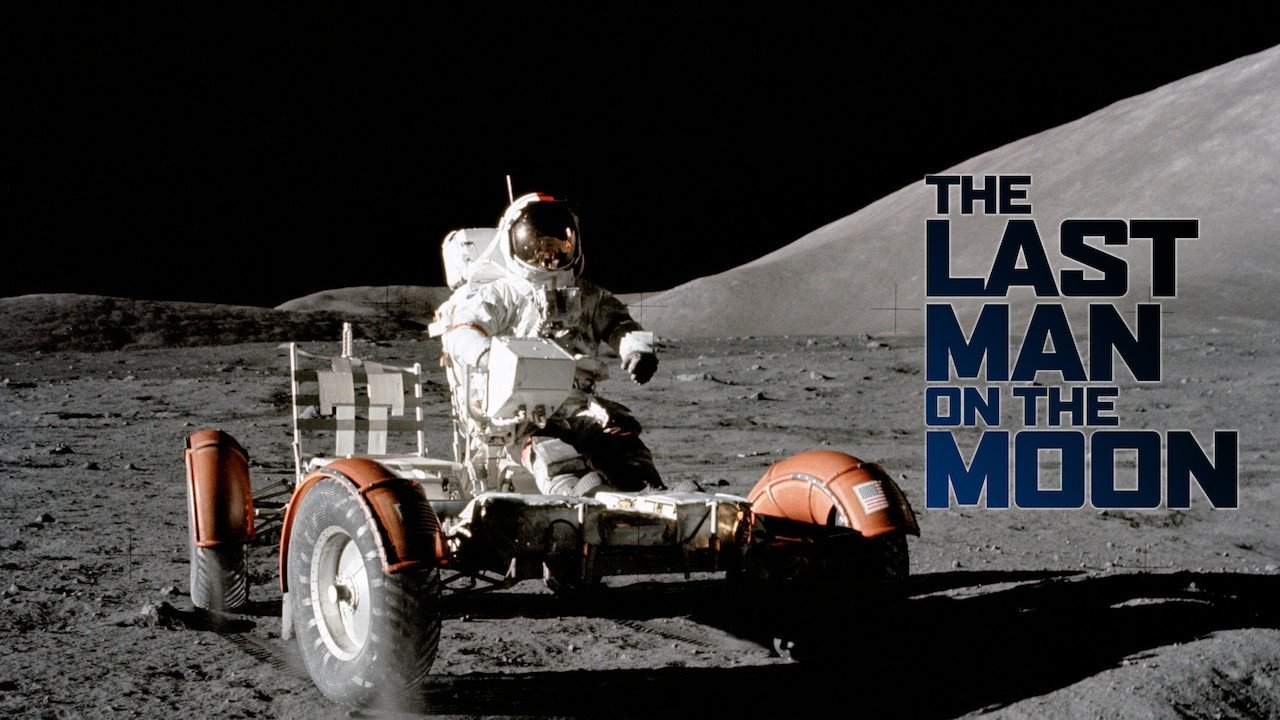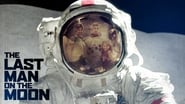gavin6942
When Apollo astronaut Gene Cernan stepped off the moon in December 1972 he left his footprints and his daughter's initials in the lunar dust. Only now is he ready to share his epic but deeply personal story of fulfillment, love, and loss.Before watching this, I watched "For All Mankind". And they work perfectly as bookends to each other -- one film about the Apollo missions in broad strokes, and a second to wrap up the final mission and its aftermath. Together they present a fairly complete picture.It is interesting how little we know about the Apollo astronauts. Most people probably can't name more than one or two, and even of those two, what do they know of their lives beyond that single trip? This film attempts to give some humanity to the godlike aura of the astronaut.
tonyhaines-spp
I highly recommend this movie for anyone, but if you are a NASA buff you will see footage that is rarely seen. As an avid NASA fan boy from the 60s it's difficult to show me shots I have not seen before. This movie did that well. I appreciate how they mixed the old footage into this modern retrospective. Instead of expanding the old 4:3 footage and exploding pixels they just let it be. The Last Man on the Moon is unique film because of the elements that are not in the movie as well. Not in the movie are the rehashed NASA film angles that we are all kinda done with. Another standard of NASA movies is the heroic main characters and astronauts. Most of the personal stories still known today were products of the NASA press office and Time magazine. This movie avoids those fictional narratives. I loved the way we get to know Gene Cernan the man. Here's a guy with many flaws but he was good enough to fly into space three times. The film makers took their sweet time telling his story from early childhood to now, an 82 year old grandfather. The sound track is excellent! The film uses a perfect mix of original and period music. I was there when Apollo 17 launched from pad 39a in 1972. It was my fourth time watching a Saturn 5 lift off. This one was different however. It was late at night, delayed a few times. When it finally took off the night turned into day, it made a fitting end to the Apollo story.
mikerosslaw
One of the big reasons that NASA got their funding cut is that they never took full advantage of their own exclusive access to stunning space visuals to engage the American public, and keep them engaged. Sadly, like most inferior documentaries, "The Last Man on the Moon" relies far much too much on "talking heads," and it contains only a miserly few minutes of actual footage of Moon or even actual space exploration. I couldn't stand any more close-ups of old guys reminiscing about the good old days. I wanted to see more action footage of what they astronauts did, not hear about it. Also, the mawkish, nauseating sentimentality of pic forced me to turn it off fifteen minutes before it was over. MEMO TO THE PRODUCERS: HELLO?! IT'S A MOTION PICTURE! DON'T JUST TELL US. SHOW US!**You turned what could have been a spectacular visual odyssey into a saccharine soap opera. I couldn't care less what became of Mr. Cernan's marriage. I know that the astronauts were heroic, but you deprived us all of much of the priceless visual footage available showing exactly what made them heroes. You failed to exploit what must be an untapped veritable treasure chest of unseen space travel footage at NASA, and relied instead on the cliché of talking heads for filler. Boring.NASA has always been clueless about the value of providing comprehensive visuals to the public. We the public want to see NASA's stellar accomplishments. Had they understood the political and economic realities of governmental funding, NASA from the get-go would have created an entire division devoted exclusively to producing space exploration films for schools, TV, theaters, and yes, even for Congress, using breathtaking space exploration footage. This would have kept the program literally in the public eye with spectacular visuals of our nation's bold adventures, and it would doubtless have excited public support and fully justified with nonverbal eloquence the need for space exploration. Most people don't understand or care about tech-talk, but they fully appreciate breathtaking photos and true adventure motion pictures. NASA had a monopoly on the space exploration genre, but sat on the images instead of sharing them, say, in creating an ongoing series visually chronicling the heroic exploits of our space programs. No documentary has never have been successful relying on talking heads. It's a lazy, artless way to pad a treatment of an otherwise interesting and film-worthy idea. Walt Disney understood this and executed his timeless visual masterpieces in his marvelous "Disneyland" TV nature documentaries and theater productions as far back as the 1950s! Walt didn't lecture us; he showed us in stunning 35mm color motion pictures. You know, like NASA should have been dong for decades.In short, producers, YOU FAILED TO MAKE SPACE TRAVEL ITSELF THE STAR. Cosmically disappointing, and infinitely boring and overripe.**For an example of what I'm writing about, see my short nature documentary "The Underwater Wildlife of Big Sur" that I personally shot and produced at: https://www.youtube.com/watch?v=DtN0QCi2G2M
cinemacy
On Wednesday, February 24th, scientists detected the origin point of a space radio signal 6 billion light-years away and managed to find the universe's missing matter as a result. This incredible discovery is a strong reminder of how far we've come since 1969, the moment when Apollo 11 astronaut Neil Armstrong declared the first successful mission to the Moon as One small step for man, one giant leap for mankind. Since Armstrong, twelve men in total have walked on the moon during the Apollo missions from 1969-1972. Of these 12, Eugene "Gene" Cernan was the last, and the documentary The Last Man on the Moon is his story.Cernan's story is a unique one; a former Navy captain, his journey towards becoming a NASA astronaut started with a simple phone call. In 1961, President John F. Kennedy set the bar high for U.S. space exploration, putting pressure on the space program to be the first country to land on the moon. This public assignment given to NASA resulted in an increased demand for anyone willing to participate in the program, which lead to more opportunities for people like Gene to join. Getting his foot in the door was the easy part, he realizes in hindsight. The intense training that each of the aspiring young men endured, including desert survival, water survival, and jungle survival just to name a few, was the hard part. The best thing to come from that experience, Gene remarks, was the strong bonds he made with the other men.His close friendships with his co-workers also made the tough times almost unbearable. Two deadly events, the unexpected crash of Gemini 9 which claimed the lives of the two pilots in his crew as well as the emotional Apollo 1 fire of 1967, when his neighbor and good friend Roger Chaffee and two other men died as a result of a flash cabin fire in the shuttle, shook up Cernan's world. At the time, he was married with a young daughter and the thought of never seeing his family again was extremely hard on him. However, when he was selected to be a part of the Apollo 17 crew, NASA's last mission to the moon, Cernan couldn't say no.Cernan spent three days on the moon. Right before he was about to leave, and knowing that man may not be back on the moon again for years, he left his footprints and wrote his daughter's initials in the lunar dust. He describes this moment with such intimacy and detail that it's truly humbling to listen to him.It does not feel like a traditional "documentary-style" film, thanks to the stylized approach from director Mark Craig as he strikes the perfect balance between the portrayal of Gene's personal and work life. He cuts between Gene in the present day with archival footage of his time at NASA, which, photographically, feels like a subtle effort to relive his experience. The B-roll of various space missions really does make The Martian look like a comedy. The Last Man on the Moon is a top notch documentary that feels like a perfect fit on the HBO or Showtime roster. It is humbling, poignant, hard-hitting, and emotionally charged, on top of being aesthetically rich and visually beautiful. Without giving too much away, I can say that the last shot will take your breath away as it did mine.The Last Man on the Moon is not all happy endings. This is a deeply personal film for Cernan which is why it took until now, 40 years since his return to earth, to share his story. Now living on a ranch in Texas, Gene still works to this day, as his friends and family admit that "retirement" is not in his vocabulary. This film and its message is so important and will leave the viewer feeling inspired from both Gene's words and actions. Lightheartedly joking that he can't live forever, he wants to share his knowledge and experience now because he feels an obligation to inform the younger generations about man's potential and inspire hope for the future. "I walked on the moon," he says at the end of the film, "what can't you do?"For more, visit: www.cinemacy.com



 AD
AD




